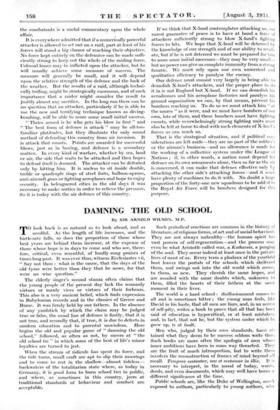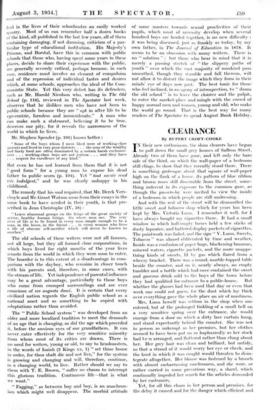DAMNING THE OLD SCHOOL
By SIR ARNOLD WILSON, M.P.
T. look back is as natural as to look ahead, and as needful. As the length of life increases, and the birth-rate falls, so does the proportion of those whose best years arc behind them increase, at the expense of those whose hope is in days to come and who are, there- fore, critical, even resentful, of loudly sung praises of times long past. It was ever thus, witness Ecclesiastes vii, "Say not thou : what is the cause, that the days of the old tyme were better than they that be nowe, for that were no wise question."
The elderly singer's second stanza often claims that the young people of the present day lack the womanly virtues or manly vices or virtues of their forbears. This also is a very ancient belief, which finds expression in Babylonian records and in the classics of Greece and Rome. It was firmly held by our fathers. In the absence of any yardstick by which the claim may be judged true or false, the usual line of defence is firstly, that it is not true, and secondly that, if true, it is due to defects in modern education and to parental unwisdom. Here begins the old and popular game of "damning the old school," followed, as often as not, by sneers at "the old school tie" in which some of the best of life's minor loyalties are turned to jest.
When the stream of ridicule has spent its force, and the tide turns, small craft are apt to slip their moorings and to come to rest in the shallow—almost tideless— backwaters of the totalitarian state where, as today in Germany, it is good form to burn school ties in public, and where, as sometimes in this country, jeers at traditional standards of behaviour and conduct are acceptable. Such periodical reactions are common in the history of literature, of religious forms, of art and of social behaviour. They are not always unhealthy—the human spirit has vast powers of self-regeneration—and the process may even be what Aristotle called war, a Katharsis, a purging of the soul. They occur indeed at least once in the piiyate Jives of most of us. Every term a phalanx of the youthful host leaves the portals of the schools which sheltered them, and swings out into the old world ,which seems, to them, so new. They cherish the same hopes, and are assailed with the same doubts which, unknown to them, filled the hearts of their fathers at the same moment in their lives.
The world is a hard school : disillusionment .comes to all and is sometimes bitter ; the young :man feels, like David in his haste, that all men are liars; and, in.= access of self-pity, writes a book to prove that all that has been said of education is . hypocritical, or . at least miSta.keit, and, in fact, that not he, but the system under which he grew up, is at fault.
Men who, judged by their own standards, have at- tained what they deem to be success seldom write thus. Such books are more often the apologia of men whose inner ambitions have been in -some way thwarted. They are the fruit of much introspection, but to write them involves the reconstruction of frames of mind beyond all recall. Tempora mutantur, nos et mutamur in illis. It is necessary to interpret, in the mood of today, words, deeds, and even documents, which may well have borne a different significance at the time.
Public schools are, like the Duke of Wellington, much exposed to authors, particularly to young Authors, who find in the lives of their schoolmates an easily worked quarry. Most of us can remember half a dozen books of the kind, all published in the last few years, all of them containing damaging, if not damning, criticism of a par- ticular type of educational institution. His Majesty's Prisons, and Borstal, have this in common with public schools that -those who, having spent some years in these places, decide to share their experience with the public, are generally severely critical, perhaps because, in each ease, residence must involve an element of compulsion and of the repression of individual tastes and desires which, at some schools, approaches the ideal of the Com- munistic State. Yet this very defect has its defenders, such as Mr. Harold Nicolson who, writing in The Old School (p. 110), reviewed in The Spectator last week, observes that he dislikes men who have not been to public schools because they are "apt in after life to be ego-centric, formless and inconsiderate." A man who can make such a statement, believing it to be true, deserves our pity, for it reveals the narrowness of the world in which he lives.
Mr. Stephen Spender (p. 191) knows better : "Some of the boys whom I most liked were of working-class parents and lived livery poor districts. . . the sons of the wealthy and finely bred are often dominated by a certain harsh exclusive-
ness . working-class boys are not jealous . . . and they have . . . respect for excellence of any kind."
But even he has not learned from them that it is not "good form" for a young man to expose his dead father to public scorn (p. 194). Yet "tout saroir rend ties indulgent," and he was clearly unhappy in his childhood.
The remedy that his soul required, that Mr. Derek Vers- choyle and Mr. Grant Watson seem from their essays in the same book to have needed in their youth, is that pre- scribed in Jean Christophe (IV, 58) :
"Leave abnormal groups on the fringe of the great society of active, healthy human beings. Co where men are. The very river of life is to be found in every man simple enough to be a man, in the lover, in the friend . . . in every woman who lives a life of obscure self-sacrifice which will never be known to another."
The old schools of these writers were not all famous, not all large, but they all formed close corporations, in Which boys lived for eight months of the year lives remote from the world in which they were soon to enter. The hoarder is V) this extent at a disadvantage in com- parison With the dayboy, who remains in closer touch with his parents and, therefore, in some cases, with the stream Of life. Yet independence of parental influence may he a great advantage, particularly to those boys who come from cramped surroundings and are ever conscious of res angusta domi. It is certain that every civilized nation regards the English public school as a national asset and as something to be copied with adaptations rather than avoided.
The "Public School system" was developed from an older_ and more localized tradition to meet the demands of an age that is changing, as did the age which preceded it, before the anxious eyes of our grandfathers. It can never ,cater effectively for the very sensitive minority from whom most of its critics are drawn. There is no need for writers, young or old, to say to headmasters, in the words of Isaiah (2 Kings xx, 1) "set thine house in order, for thou shalt die and not live," for the system is growing and changing and will, therefore, continue, in a changing world, to live. Rather should we say to them with T. E. Brown, "suffer no chasm to interrupt this glorious tradition. Continuous life—that is what we want."
"Fagging," as between boy and boy, is an anachron- ism which might well disappear. The morbid attitude of some masters towards sexual proclivities of their pupils, which must of necessity develop when several hundred boys are herded together, is no new difficulty : it was being discussed, just as frankly as today, by my own father, in The Journal of Education in 1878. It seems to be an obsession with many writers. There is no " solution " : but those who bear in mind that it is merely a passing stretch of " the slippery paths of youth " over which the vast majority of mankind pass unscathed, though they stumble and fall thereon, will not allow it to distort the image which they form in their minds' eye of days now past. The best tonic for those who feel inclined, in an agony of introspection, to " damn the old school" is to leave the cloister and the pulpit, to enter the market-place and mingle with the crowd of happy normal men and women, young and old, who make the world go round. That is the best way for many readers of The Spectator to spend August Bank Holiday.































 Previous page
Previous page